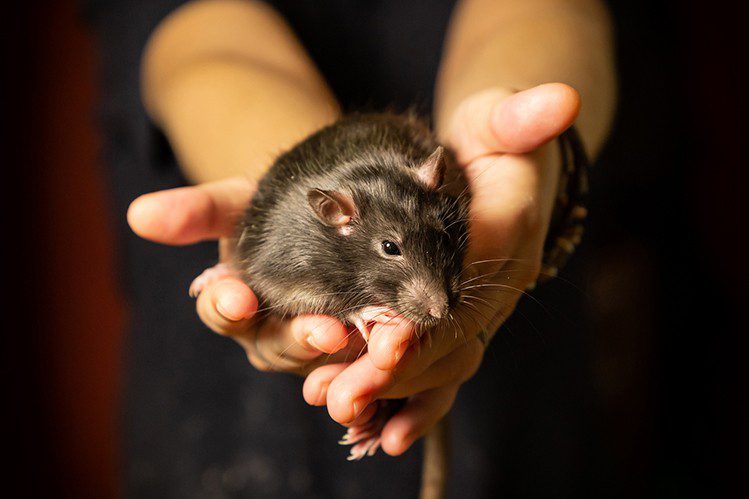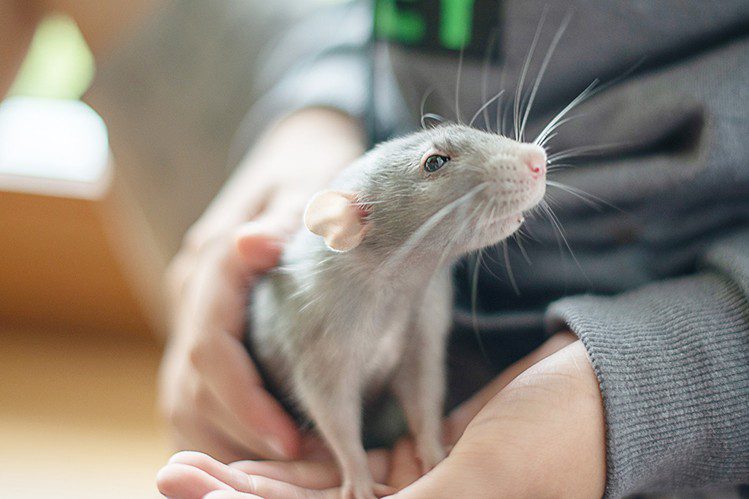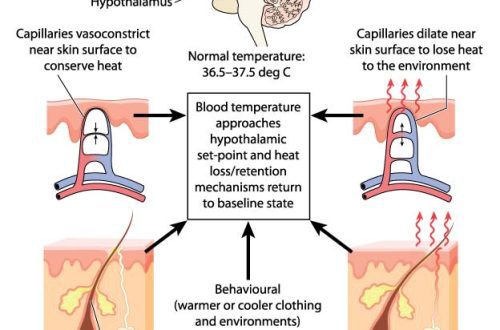
Why does a rat bite and how to wean it from it?
A domestic decorative rat is a friendly, intelligent creature that will become a true friend to a caring owner. But often rat owners complain that their pet bites. Let’s see what could be the reasons for this behavior and how to correct it.
If a decorative rat bites, there is definitely a reason for this. We emphasize that not every bite speaks of negativity on the part of the pet. In their natural habitat, rodents use biting to communicate. The meaning of such a weak bite can be learned by observing the physical and emotional state of the rat. Light tingling of teeth means your pet is interested in you. Biting speaks of sympathy: such manipulations are performed by rats when they clean each other’s fur.
If a pet comes up to you and bites once, but quite tangibly, he needs a little attention. If after a single bite the rat runs away, but looks back and comes back to you, then it’s time to play.
With the game and communication, everything is clear. Of much greater concern is the question of why the domestic rat bites until it bleeds. This behavior is typical for males during puberty: at the age of five to seven months. Hormones play in the pet, he needs peace, your ward is going through a restructuring of the body.
For females, aggressive behavior and the desire to bite the host are typical during pregnancy and care for offspring. Instinct tells the mother rat that any violation of personal space, a hypothetical threat is a reason to actively protect her cubs.

What other reasons could there be?
- desire to dominate. Sometimes young animals try to dominate, establish a hierarchy. Biting can be an element of self-affirmation. This is a kind of challenge, a test of strength. Continue to communicate calmly without using physical actions. Treat with a treat, interest in something.
- Stress, fear, feeling of danger, uncomfortable conditions of detention, for example, a cramped cage.
- Loud sounds of fireworks on the street or repairs behind the wall.
- Moving to a new place of residence is an adventure, after which the pet will recover for several days.
- Disturbing odors. If you are a new owner of a decorative rat, the unfamiliar smell of your hands can scare off a four-legged friend.
After interacting with other pets (dogs, cats, birds, etc.), be sure to wash your hands. It will be better if the rat does not smell another animal: it can disturb her.
- Negative communication experience. Scary and as if ready to attack are rats that were not lucky with their previous owners. The urge to bite comes from mistreatment and neglect.
- Too much attention. There is no need to overdo it with communication and carrying a pet in your arms. Exhausted by hugs and games, a rat may bite you as a warning.
- Bad mood and personality trait. Sometimes a rat bites simply because it is in a bad mood. Your ward will bite a neighbor in a cage because of territorial disagreements or feelings of jealousy. Rats, like people, have a different character – some rats never bite at all, while for others it is a normal reaction to any strong stimulus.
- Hunger. It is possible that a decorative rat bites because of a feeling of hunger. Do not forget to feed your ward regularly. Wash your hands after preparing food, otherwise the smell of food will confuse your pet.
- Diseases. Perhaps your pet is sick and experiencing pain and discomfort – and this makes him behave restlessly. You may not even suspect that your pet is unwell. Therefore, if something worries you in the state and behavior of a rat, first of all discuss the issue with a veterinarian.

If a domestic decorative rat is healthy, vaccinated, kept in good conditions, its bite does not threaten with serious consequences. But her teeth are thin and long, so they leave a deep wound, the edges of which quickly heal. Because of this, dangerous microbes can remain in the wound.
How to help with a bite of a domestic rat? We squeeze out a few drops of blood from the wound, then treat it with an antiseptic and seal it with a plaster.
Within two to three days after a rat bite, carefully monitor your well-being. If the wound becomes noticeably inflamed, headache or muscle pain appears, the temperature rises, you will need to see a doctor.
The main thing is to raise a pet from childhood. All behavioral responses are formed in childhood. If you do not teach your pet basic behavioral skills from childhood, then your future friendship may be in question.
How to stop a rat from biting?
- It is important to understand that physical punishment when raising a pet is unacceptable. Do not try to punish a rat, raise your voice at her. Your ward will not understand why you are angry, and the relationship with the pet will be ruined.
- Some phases of behavior just need to be waited out. If your pet is going through puberty or another stressful period, try not to disturb him. After a couple of months, it will become easier for you to establish communication. It is also better not to disturb a pregnant female, her main task now is to take care of her offspring.
- If a rat has just appeared in your house, protect it from unnecessary touches and noise for a few days. Do not place the cage next to a TV or radio. Let the rat gradually get used to the smell of your hands. Start giving her treats through the cage door. Soon your ward will get used to you and imbued with confidence.
- Unreasonable attempts by a rat to bite you must be stopped. If a rat has bitten you during a fun game, move the pet away from you with your hand. This way you will show that you do not like this behavior.
Another remedy is a spray bottle with clean water. As soon as a rat bites you, you immediately sprinkle it with water. The pet will figure out that the unpleasant light shower from the sprinkler is connected with her act. The spray gun will help you out when one rat starts to bite the neighbor in the cage. One zilch – and the conflicting parties scatter to different corners of the cage. If the unwanted behavior continues, it is best to separate the rats into separate cages.
- If domestic rats bite in an attempt to assert their superiority, an effective educational measure is to turn the pet on its back and hold until the toothy tomboy calms down. Rats behave in a similar way to each other when they figure out who is in charge here. Do not let the pet escape, otherwise the educational measure will not work, and the mustachioed hooligan will think he is the master of the situation. But do not put pressure on the body of the rat, it should not hurt. Experienced rat breeders use rolling on their back as an explanation to the pet that this is not the way to behave.
Find time to play with your pet, pay attention to it. If a domestic rat feels love and care from your side, there will be fewer problems with its behavior. We wish you to always find a common language with your pets!





